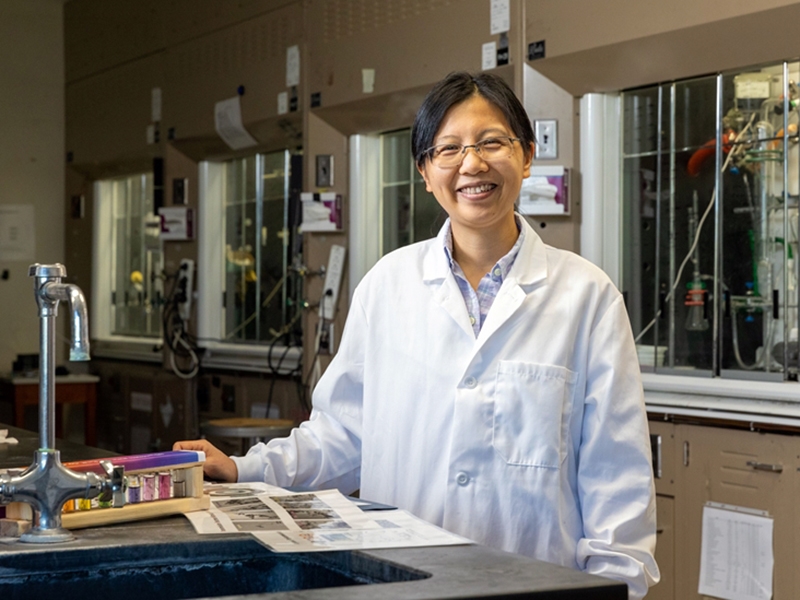Jingyi Chen likes to build things. When she was choosing where to go to college, she had a dilemma: Did she want to build big things, like homes and buildings, or very small things constructed from atoms and molecules?
"I was interested in knowing what reaction is happening and how it's happening," she said, "not just the overall reaction but the intermediate steps right down to the molecular level."
She decided to go small and is now a professor of physical chemistry at the University of Arkansas.
Chen has been with the university since 2010 and has been awarded nearly $2.5 million in research funding in that time. She leads the Chen Research Group, where her team's research interests lie in the development of novel materials and their applications in various fields, including catalysis, energy storage, and environmental remediation. Chen's collaborative and interdisciplinary approach has attracted a talented group of researchers, contributing to the success of the group.
An area of interest to Chen is how the physical properties of macroscopic objects arise out of the component atoms as they aggregate into larger and larger particles. She is developing novel multi-metal-based nanostructures and new methods for functionalizing their surface with soft materials. The ultimate goal of her research is to establish the structure-property relationship and further explore their applications in energy conversion, tribology and nanomedicine.
In more practical terms, Chen is working on a more efficient way to electrolyze water into hydrogen and oxygen, as a means of facilitating, and lowering the cost, of hydrogen production. In 2021, the Department of Energy announced its Hydrogen Shot, the goal of which is to reduce the cost of a kilo of hydrogen to $1 within ten years — down 80% from its current cost of about $5 per kilo. Chen was happy to accept that challenge.
"We're focused on the oxygen evolution reaction," she explained, "which means making oxygen. Making oxygen helps to make hydrogen because when we split water, we have to have both sides of the reaction be efficient. It turns out the kinetic barrier is on the oxygen side. There is only one election transfer for the hydrogen evolution reaction and there are four electrons involved in the oxygen evolution reaction, so that is more the technologically difficult barrier."
Ultimately, she says, "I am focused on lowering the overall costs of electrolysis by making it more efficient."
Another specific area of interest of Chen's is developing an antimicrobial surface that resists contamination. She is working in collaboration with Yong Wang, an associate professor of physics, to develop a nanoparticle coating that could be used on high contact surfaces, which could be particularly helpful in places like hospitals. Chen and two of her graduate students went through I-Corps training to explore potential paths to commercialization of this technology.
Chen was recently inducted into the American Institute for Medical and Biological Engineering's College of Fellows. The honor recognizes her outstanding research and leadership in the field of physical chemistry, particularly her pioneering work in nanostructured multimetals and hybrid materials. The induction into the College of Fellows, as well as being named an Arkansas Research Alliance fellow in 2018, are testaments to Chen's impactful contributions and her commitment to advancing the boundaries of scientific knowledge.
Topics
Contacts
Hardin Young, assistant director of research communications
University Relations
479-595-9393, hyoung@uark.edu
